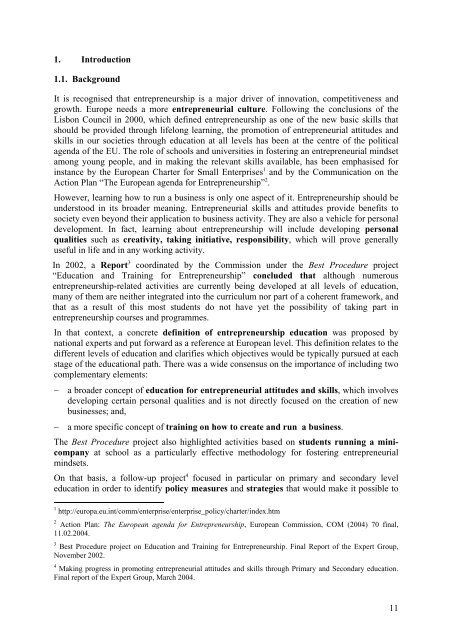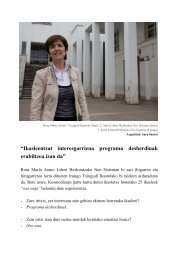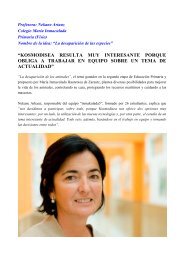Final Report of the Expert Group - European Commission - Europa
Final Report of the Expert Group - European Commission - Europa
Final Report of the Expert Group - European Commission - Europa
You also want an ePaper? Increase the reach of your titles
YUMPU automatically turns print PDFs into web optimized ePapers that Google loves.
1. Introduction1.1. BackgroundIt is recognised that entrepreneurship is a major driver <strong>of</strong> innovation, competitiveness andgrowth. Europe needs a more entrepreneurial culture. Following <strong>the</strong> conclusions <strong>of</strong> <strong>the</strong>Lisbon Council in 2000, which defined entrepreneurship as one <strong>of</strong> <strong>the</strong> new basic skills thatshould be provided through lifelong learning, <strong>the</strong> promotion <strong>of</strong> entrepreneurial attitudes andskills in our societies through education at all levels has been at <strong>the</strong> centre <strong>of</strong> <strong>the</strong> politicalagenda <strong>of</strong> <strong>the</strong> EU. The role <strong>of</strong> schools and universities in fostering an entrepreneurial mindsetamong young people, and in making <strong>the</strong> relevant skills available, has been emphasised forinstance by <strong>the</strong> <strong>European</strong> Charter for Small Enterprises 1 and by <strong>the</strong> Communication on <strong>the</strong>Action Plan “The <strong>European</strong> agenda for Entrepreneurship” 2 .However, learning how to run a business is only one aspect <strong>of</strong> it. Entrepreneurship should beunderstood in its broader meaning. Entrepreneurial skills and attitudes provide benefits tosociety even beyond <strong>the</strong>ir application to business activity. They are also a vehicle for personaldevelopment. In fact, learning about entrepreneurship will include developing personalqualities such as creativity, taking initiative, responsibility, which will prove generallyuseful in life and in any working activity.In 2002, a <strong>Report</strong> 3 coordinated by <strong>the</strong> <strong>Commission</strong> under <strong>the</strong> Best Procedure project“Education and Training for Entrepreneurship” concluded that although numerousentrepreneurship-related activities are currently being developed at all levels <strong>of</strong> education,many <strong>of</strong> <strong>the</strong>m are nei<strong>the</strong>r integrated into <strong>the</strong> curriculum nor part <strong>of</strong> a coherent framework, andthat as a result <strong>of</strong> this most students do not have yet <strong>the</strong> possibility <strong>of</strong> taking part inentrepreneurship courses and programmes.In that context, a concrete definition <strong>of</strong> entrepreneurship education was proposed bynational experts and put forward as a reference at <strong>European</strong> level. This definition relates to <strong>the</strong>different levels <strong>of</strong> education and clarifies which objectives would be typically pursued at eachstage <strong>of</strong> <strong>the</strong> educational path. There was a wide consensus on <strong>the</strong> importance <strong>of</strong> including twocomplementary elements:− a broader concept <strong>of</strong> education for entrepreneurial attitudes and skills, which involvesdeveloping certain personal qualities and is not directly focused on <strong>the</strong> creation <strong>of</strong> newbusinesses; and,− a more specific concept <strong>of</strong> training on how to create and run a business.The Best Procedure project also highlighted activities based on students running a minicompanyat school as a particularly effective methodology for fostering entrepreneurialmindsets.On that basis, a follow-up project 4 focused in particular on primary and secondary leveleducation in order to identify policy measures and strategies that would make it possible to1 http://europa.eu.int/comm/enterprise/enterprise_policy/charter/index.htm2 Action Plan: The <strong>European</strong> agenda for Entrepreneurship, <strong>European</strong> <strong>Commission</strong>, COM (2004) 70 final,11.02.2004.3 Best Procedure project on Education and Training for Entrepreneurship. <strong>Final</strong> <strong>Report</strong> <strong>of</strong> <strong>the</strong> <strong>Expert</strong> <strong>Group</strong>,November 2002.4 Making progress in promoting entrepreneurial attitudes and skills through Primary and Secondary education.<strong>Final</strong> report <strong>of</strong> <strong>the</strong> <strong>Expert</strong> <strong>Group</strong>, March 2004.11




